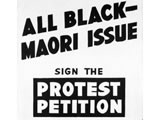What happened that day?
See historic events for any day of the year by entering the date below. Why not try your birthday?
Kiwi of the Week
Today in History

1960 All-white All Blacks leave for South Africa
The slogan ‘No Maoris − No Tour’ fell on deaf ears as this controversial rugby tour went ahead. The issue of sporting ties with South Africa was eventually to split the country in devastating fashion in 1981.
Touring South Africa, with its entrenched racial segregation, had posed problems for New Zealand rugby since 1928, when the All Blacks first travelled there. Although Māori players had always been eligible to represent New Zealand, the NZ Rugby Football Union chose not to select them for tours to South Africa. In 1928 this meant leaving players like the legendary George Nēpia behind. No Māori would be selected to tour South Africa until 1970, and even then they had to travel as ‘honorary whites’.
In 1960 nearly 160,000 people signed a petition − one of the largest in New Zealand history − opposing that year’s tour. They argued against the selection of what amounted to an ‘all white All Blacks’ team. Groups like the Citizens’ All Black Tour Association campaigned with the slogan, ‘No Maoris − No Tour’. Others argued that politics had no place in sport. In the end, the Wilson Whineray-led team left for South Africa as planned.
Meanwhile, the Howard Morrison Quartet had a big hit with the single, ‘My Old Man’s an All Black’, which took a dig at the decision to leave Māori players out of the team:
Oh, my old man’s an All Black,
He wears the silver fern,
But his mates just couldn’t take him
So he’s out now for a turn.
(Fi Fi Fo Fum, there’s no Horis in this scrum.)
For the record, the All Blacks lost the controversial series 2–1, with one match drawn.














